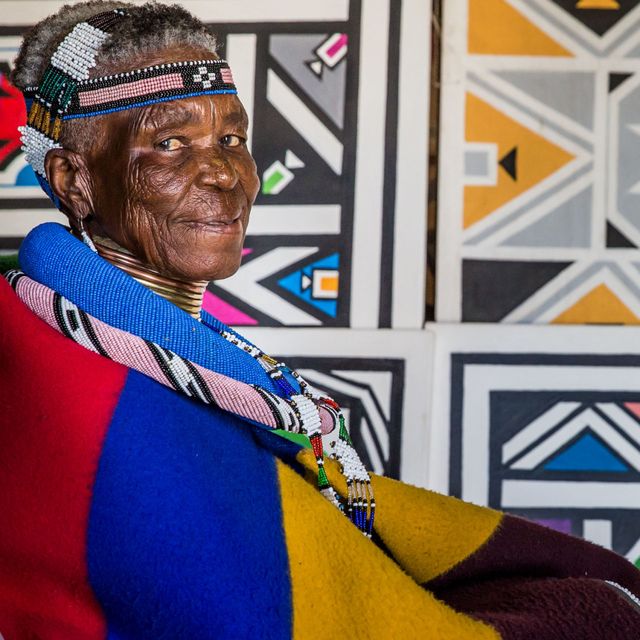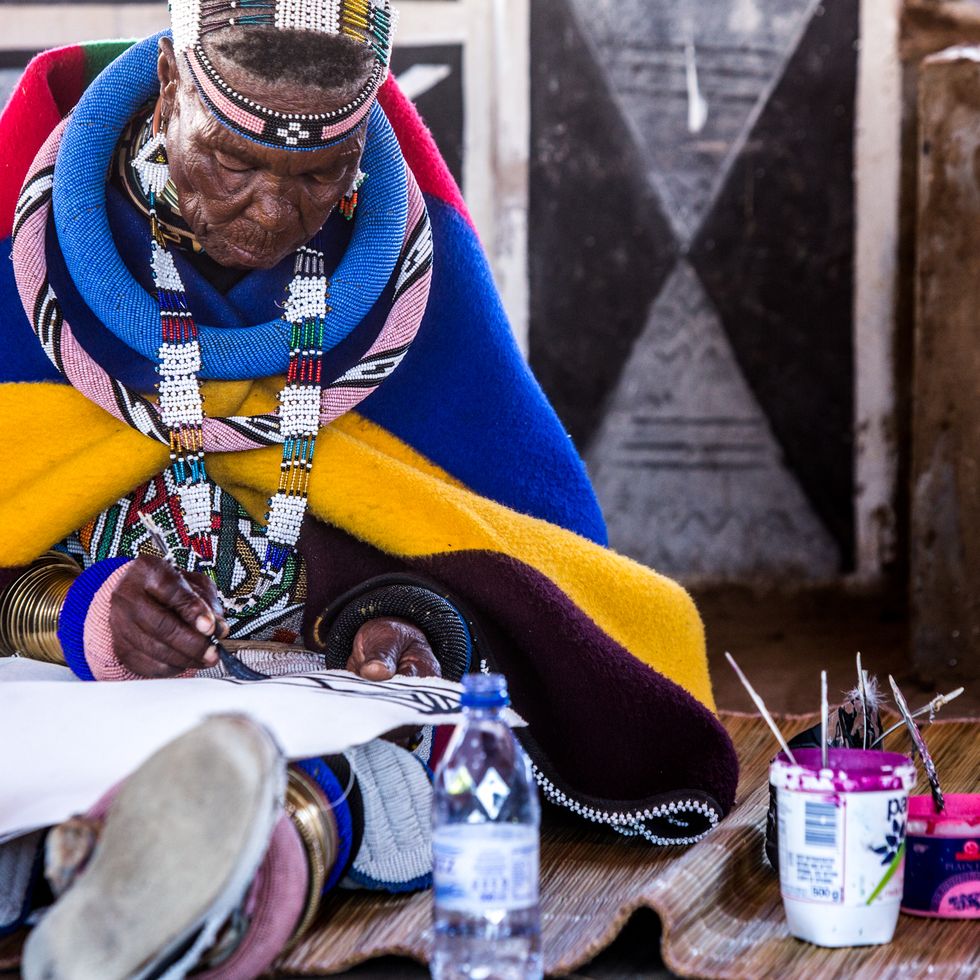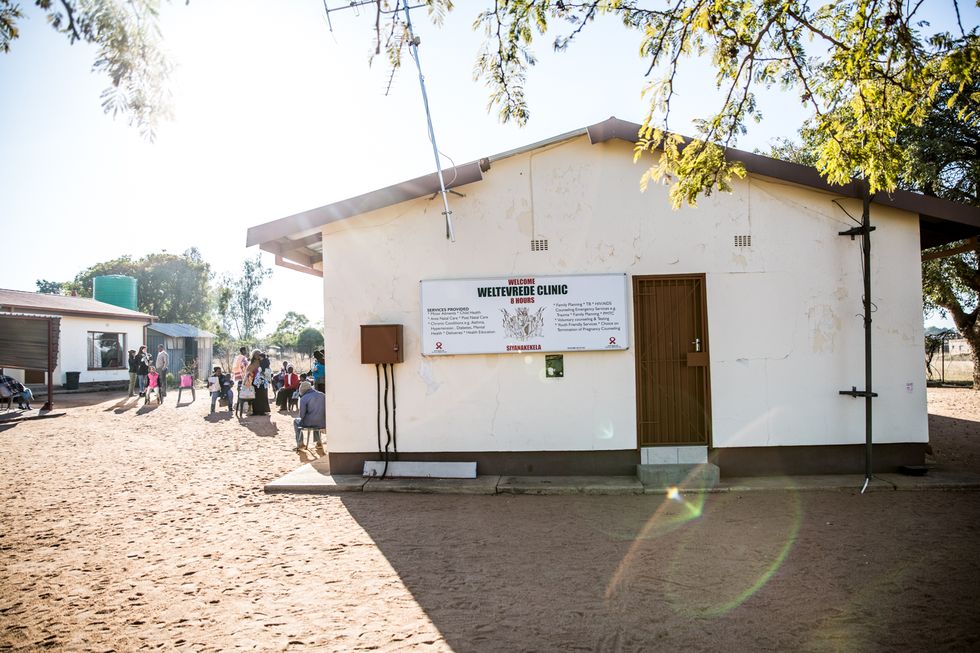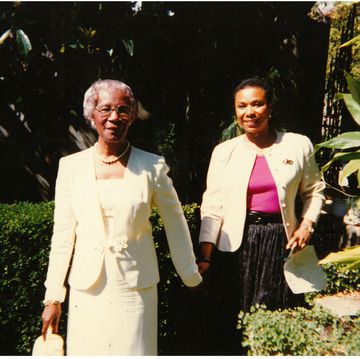Esther Mahlangu hands me a chicken feather. She teaches me how to strip it and save a little tuft at the tip. She shows me how I'm supposed to hold it, dipping it into jet black paint. I follow her example and trace a pattern onto a swatch of canvas. When she stops to examine my work, she clasps her hands together. "This is Ndebele," she whispers, referring to the centuries-old culture and traditions of the Ndebele people.
Mahlangu, 82, is an artist and a teacher. She lives in the Mpumalanga province in South Africa, where she was born; the closest town is about two hours away. Around the village, the huts and gazebos are decorated with her characteristic geometric patterns. Every wall, every door, even the windowpanes, displays another one of her masterpieces. But her works are not restricted to the Mpumalanga province. She has traveled the world, showing in museums across Europe and North America, fulfilling commissions for the likes of BMW and British Airways.
Most recently, Mahlangu has teamed up with Belvedere Vodka, John Legend, and (RED), the Bono-founded charitable organization, to raise awareness about AIDS and STIs. Belvedere tapped Mahlangu, who never drinks, to create a special-edition bottle of the vodka. Fifty percent of the proceeds will be donated to the Global Fund to eradicate HIV/AIDS.
At least 6.6 million HIV-infected people live in South Africa, accounting for 18 percent of infected individuals worldwide. Around 380,000 new HIV infections were reported in 2015. And only 17 million of the almost 37 million HIV-positive people in the world have access to the antiretroviral (ARV) therapies they need.
Lately, South Africa has doubled down on protective initiatives for vulnerable populations and treatment plans for men and women who've already contracted the disease. The country has started to allocate resources that will ensure that every infected person has access to ARVs. At the Thembalethu clinic in Johannesburg, a specialized Pharmacy Dispensing Unit (PDU) functions like an ATM for ARVs. The machines let patients withdraw medication and teleconference with trained pharmacists, slashing the time it takes to receive their prescriptions.
Efforts are also being made to continue to reduce the transmission of HIV from mother to baby. All over South Africa, pregnant women are immediately put on ARVs, regardless of the state of their infection. Overwhelmingly, their children are born disease-free. Even at the rural Weltevreden clinic, which is less well-equipped than Thembalethu, the nurses report it's been almost eight years since a baby was born with HIV. By 2020, South Africa plans to reach "90-90-90": having 90 percent of infected people know their status, 90 percent of those people start ARVs, and 90 percent of those who've started treatment reduce the presence of the virus in their blood to imperceptible levels.
But international funds for AIDS have started to fall, dropping from $8.6 billion in 2014 to $7.5 billion in 2015. And progress is slow. This is where initiatives like Belvedere's #MaketheDifference step in. "When the private sector gets involved and communicates that it is invested in the end of AIDS, that matters," says Jennifer Lotito, chief partnerships officer at (RED). "The world, global governments pay attention."
The combination of music and the visual arts in the service of this social good is a point of pride for Legend, who explains, when we meet weeks later in New York, that he's always admired (RED). The fact that this latest initiative has introduced him to Mahlangu is a nice bonus. "I think it's a great collaboration," he says. Mahlangu and Legend have gotten to know each other well. Mahlangu visited Legend in Los Angeles for a photo shoot a few months ago, trekking from South Africa to the United States and setting off a series of metal detectors in the process. TSA employees tend not to know how to contend with Mahlangu, who dresses in tribal clothes and wears dozens of metal rings around her neck and ankles.
"They are always trying to get me to take off my wedding bands," she says, laughing and gesturing toward the bands she was given by her late husband and parents to celebrate her wedding. "People have said to me, 'It's heavy!'" she says. "But for me, it's not heavy."
When she teaches Ndebele children, she emphasizes how essential it is that they appreciate the rich culture they've inherited, that they revere it. "It's when you know who you are—that's when you know where you are going," she says. "And they must protect themselves," she says, nodding to the AIDS crisis. "Wherever they go, they must educate and protect themselves."
"I think it would be amazing for our kids to grow up in a world where no one has to die from AIDS," Legend says. "And I think we're getting closer to it. But a lot of [the solution] is about expanding access, getting people to the services that they need." He believes that he and Mahlangu can be effective ambassadors for that effort. "We have a chance to tell stories and also bring people together and get attention for certain causes," he says. "To use that attention for good—that's the greatest."















